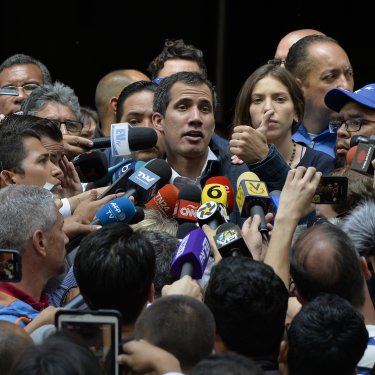Venezuela censors its political crisis

Reporters Without Borders (RSF) condemns the disastrous climate for journalists in Venezuela, where the deepening political crisis has been accompanied by increasingly blatant and disturbing censorship of non-governmental media. The government must respect the freedom to inform, RSF says.
What with arrests of reporters, confiscation of their equipment, police violence against them during demonstrations, Internet cuts and outright broadcast bans, access to objective and pluralist reporting has been virtually impossible for most Venezuelans during the past few days of historic developments and turmoil.
On 23 January, the day that national assembly president Juan Guaidó declared himself to be interim president amid major demonstrations and clashes throughout the country, no national TV channel broadcast Guaidó’s address, while the authorities harassed and attacked independent media outlets critical of President Nicolás Maduro that tried to cover these historic events.
Personnel from the General Directorate for Military Counter-Intelligence (DGCIM) and the Bolivarian Intelligence Service (SEBIN) stormed the offices of three media outlets – Global TV, Noticia Al Día and Aventura TV – in Maracaibo, the capital of the northwestern state of Zulia, on 23 January, smashing electronic equipment and cutting Internet access. Global TV’s broadcast signal was suspended on the grounds that it “broadcast Juan Guaidó’s speech live.”
Censorship and restricted access to news
César Miguel Rondón, a much respected radio presenter who has been hosting the morning news and current affairs programme Circuito Éxitos for 30 years, announced on the air on 24 January that he could not provide details about the political crisis nor broadcast his traditional editorial because “the circumstances do not permit it.” His programme was subsequently taken off the air, and yesterday he said: “This was not self-censorship. It was full-blown censorship that silenced us.”
The 24-hour news service broadcast by the Chilean public broadcaster TVN, normally available in Venezuela on the DirectTV cable channel 708, was taken off the air on the direct orders of Venezuela’s National Commission for Telecommunications (CONATEL). Other TV channels such as Venevisión and Televen interrupted their broadcasts on 23 January when Guaidó began delivering his speech and took his oath of office.
On 23 January alone, the local NGO Espacio Público has counted no fewer than 17 direct attacks against journalists, including arbitrary detentions, confiscation of equipment and violence by police or soldiers.
“This persecution of journalists by the Venezuelan state apparatus is utterly counter-productive and reinforces President Maduro’s isolation,” said Emmanuel Colombié, the head of RSF’s Latin America bureau. “Press freedom is in great danger in Venezuela. The Maduro administration must stop censoring and systematically obstructing journalists’ work and must instead guarantee their safety. In this time of trouble, the freedom to inform is more essential than ever for all Venezuelans.”
Internet cuts and cyber-space regulation
In addition to the direct censorship and violence, the past month in Venezuela has also seen unusual information blackouts and restrictions on access to social networks, which are massively used by Maduro’s opponents.
On 21 January, shortly after an attempted uprising by a military unit in Zulia state that was widely covered on social networks and by online media outlets, there were several Internet cuts in the region, affecting YouTube and Google Search users in particular, combined with restrictions on access to Twitter and Instagram.
Facebook, Instagram, YouTube and Periscope services were all temporarily blocked yesterday in Venezuela, according to NetBlocks, an international NGO that monitors the Internet. The online encyclopedia Wikipedia has meanwhile been inaccessible in Venezuela since 12 January.
This trend is all the more disturbing in the wake of a leak to the media a few days ago revealing the existence of a proposed “Cyberspace Law” designed to increase the government’s power to control Internet access and use. On 23 January, RSF joined a national and international NGO coalition in voicing concern about the bill.
Finally, RSF points out that Billy Six, a German journalist arrested on 17 November, is still being held at the Helicoide military prison in Caracas for “violating a security zone,” a charge for which there is absolutely no evidence. The charge was brought before a military court in the northwestern state of Falcón, which was due to hold an initial hearing on 23 January. It was cancelled because of a failure to transfer Six to Falcón for the hearing. RSF reiterates its call for due process for this journalist and for his immediate release.
Venezuela is ranked 143rd out of 180 countries in RSF’s 2018 World Press Freedom Index.



